

Large-scale die-off of sea urchins discovered off Kaumakani - Thegardenisland.com: Local. PORT ALLEN — While conducting a recent diving tour along Kaua‘i’s southern coast, a diver made an alarming discovery: a field of dead heart sea urchins on the ocean floor.
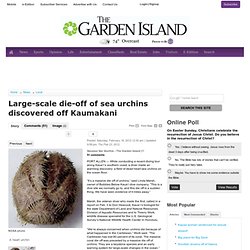
“It’s a massive die off of urchins,” said Linda Marsh, owner of Bubbles Below Kaua‘i dive company. “This is a dive site we normally go to, and this die off is a sudden thing. We have seen evidence of it miles away.” Marsh, the veteran diver who made the find, called in a report on Feb. 3 to Don Heacock, Kaua‘i’s biologist for the state Department of Land and Natural Resources Division of Aquatic Resources and to Thierry Work, wildlife disease specialist for the U.S. Geological Survey’s National Wildlife Health Center in Honolulu. “We’re always concerned when urchins die because of what happened in the Caribbean,” Work said. Marsh led Work and Heacock to the dive site on Feb. 5, and the biologists began a two-day field investigation that included surveys and sample collections. Sponsors - The World Food Prize - Improving the Quality, Quantity and Availability of Food in the World.
THE WORLD FOOD PRIZE sincerely thanks the following donors for supporting the World Food Prize Foundation: The Governor and The State Legislature of IowaIowa Economic Development AuthorityThe John Ruan Foundation TrustThe Rockefeller Foundation The Bill & Melinda Gates Foundation • DuPont Pioneer • Howard G.
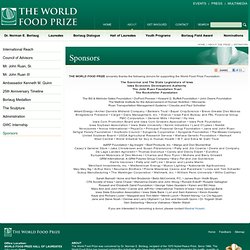
Buffett Foundation • John Deere FoundationThe Mathile Institute for the Advancement of Human Nutrition • MonsantoRuan Transportation Management Systems • Claudia and Paul Schickler If you are interested in becoming a donor, please contact Mashal Husain. Dr. Robert T. Fraley. Secretary of State John Kerry's Remarks from the World Food Prize Laureate Announcement. Secretary of State John Kerry's Remarks from the World Food Prize Laureate Announcement Ken – excuse me – thank you very, very much.
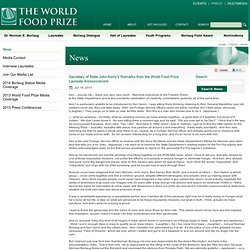
Welcome everybody to the Franklin Room, to the State Department, and to this wonderful celebration of creativity, commitment, audacity, all at the same time. And I’m particularly grateful to be introduced by Ken Quinn. I was sitting there thinking, listening to Ken, General MacArthur said old soldiers never die, they just fade away. Well, old Foreign Service officers never die either, but they don’t fade away, obviously. I – what an amazing – honestly, what an amazing journey we have shared together – a great deal of it together, but some of it hidden. Ken is the only Foreign Service officer to receive both the Army Air Medal and the State Department’s Medal for Heroism and Valor. I want to thank the generosity and the vision of John and Janis Ruan for their role. I also want to thank my colleague, my classmate, Tom Harkin for being here. The True Deservers of a Food Prize. If Secretary of State John Kerry’s G.M.O.
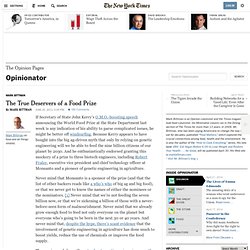
-boosting speech announcing the World Food Prize at the State Department last week is any indication of his ability to parse complicated issues, he might be better off windsurfing. Because Kerry appears to have bought into the big ag-driven myth that only by relying on genetic engineering will we be able to feed the nine billion citizens of our planet by 2050. And he enthusiastically endorsed granting this mockery of a prize to three biotech engineers, including Robert Fraley, executive vice president and chief technology officer at Monsanto and a pioneer of genetic engineering in agriculture. The carping ends here. (I wrote about genetic engineering recently, and anyway, you’ll find plenty of griping about this prize elsewhere.)
Doug Gurian-Sherman, a plant pathologist at the Union of Concerned Scientists [3] , mentioned Zeyaur Khan, who developed the “push-pull” system of pest control in sub-Saharan Africa. US State Department Awards "2013 World Food Prize" to Executive Vice President of Monsanto. For Supreme Court, Monsanto's Win Was More About Patents Than Seeds : The Salt.
A farmer holds Monsanto's "Roundup Ready" soybean seeds at his family farm in Bunceton, Mo.
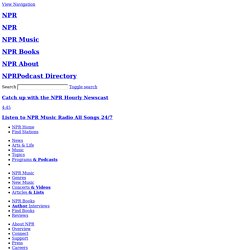
Dan Gill/AP hide caption toggle caption Dan Gill/AP A farmer holds Monsanto's "Roundup Ready" soybean seeds at his family farm in Bunceton, Mo. Dan Gill/AP The U.S. Billed as David vs. Almost all the soybean farmers in the U.S. use seed that is genetically altered to be resistant to weed killers like Roundup. Case in point, 75-year-old farmer Hugh Bowman, who regularly bought Monsanto's Roundup-resistant soybean seed for his first growth and signed a licensing agreement promising to use all the seed and not to use any regenerated seed for future use. So he went to the local grain elevator where farmers drop off their harvested soybeans, and he bought and planted some of those, knowing that those beans would likely also be Roundup-resistant. "I couldn't imagine that they'd give a rat's behind," he said.
But they — namely, Monsanto — did. So which rule applied in Bowman's case?